
"The future has a name, and its name is Hope" PopeFrancis

For priority enrolment at Catholic Schools, enrol your child with St Nicholas Early Education


"The future has a name, and its name is Hope" PopeFrancis

For priority enrolment at Catholic Schools, enrol your child with St Nicholas Early Education
In the first ever edition of Aurora, published in December 1996, Bishop Michael Malone welcomed the public to the Diocese’s new magazine. His column lead with, “This age of vivid and rapid communication builds us an expectation that news, views, ideas, attitudes, responses be COMMUNICATED to us as they happen.”
Nearly three decades later, these words still guide us.
The pages that follow make up the last print edition of our magazine, but rest assured, Aurora isn’t going anywhere. As long as people continue to share their stories with us, we will continue to tell them.
The theme of this issue is the future. We hear from Bishop Michael Kennedy on the power of hope when thinking of our future, Sustainability Manager, Drew Ashworth, on the sustainability plan for the Diocese moving forward. We speak with Catholic Schools alumnus Liam Woods on using his second chance at life to make a difference, as well as hear from the voices of tomorrow, the young people within our Diocese, on what they think success looks like.
The Diocese of Maitland-Newcastle is located on traditional lands of Awabakal, Biripi Darkinjung, Kamilaroi, Wiradjuri, Wonnarua, and Worimi peoples. We honour the wisdom of and pay respect to, Elders past, present and emerging, and acknowledge the spiritual culture of all Aboriginal and Torres Strait Islander peoples across Australia. We have much to learn from this ancient culture.
Editor: Madie Leeming
Design: Elle Tamata, David Stedman
Regular Contributors: Liz Baker, Tim Bowd, Brooke Cross, Alex Foster and Elizabeth Symington
Leeming P 02 4979 1200
As we move toward our new digital format, we look forward to bringing our stories to life. At the click of your mouse, our stories will be timely and elevated to match the pace of our ever-evolving digital landscape. We are proud to have brought you a magazine, but the next iteration of Aurora will include video, interviews, and innovation beyond what we have been able to provide in print before. It will be more accessible; it can travel anywhere in the world at any time.
This issue has been my favourite to work on. While it’s exciting to anticipate what’s to come, we have also paid homage to the past. The research into the history of Aurora has allowed me to see how many hands it has passed through, how many thousands of people’s stories it has profiled, how many corners of the world it’s been carried in, how many different – difficult, sad, happy, progressive, fulfilling – cycles our Diocese has been through over the years, and it is something I feel so incredibly proud to have an insight into and have been a small part of.
Aurora has covered everything from a myriad of natural weather disasters, to historic appointments
in the Catholic Church, to the COVID pandemic in 2020. There have been three Jubilee Years in this time, the Diocese has had three Bishops that have all remained committed to contributing thoughtful and inspiring insights to each edition. We have covered the big stories in our communities as well as given a voice to the smaller topics. We haven’t shied away from addressing the darkness, and among the darkness the teams who have worked on Aurora have always found the light –the people within our Diocese – and celebrated them.
To that note, I would like to acknowledge the dedicated editors, writers, contributors, and designers who have shaped Aurora over the years. Its success is a testament to their efforts and the strong foundation they have built—a legacy we are committed to carrying on.
In the first issue of Aurora, Fr Harold Campbell said he hopes Aurora will be valuable, informative and long-lived. It has been, and it will continue to be. We’re just getting started.
Madie Leeming Editor

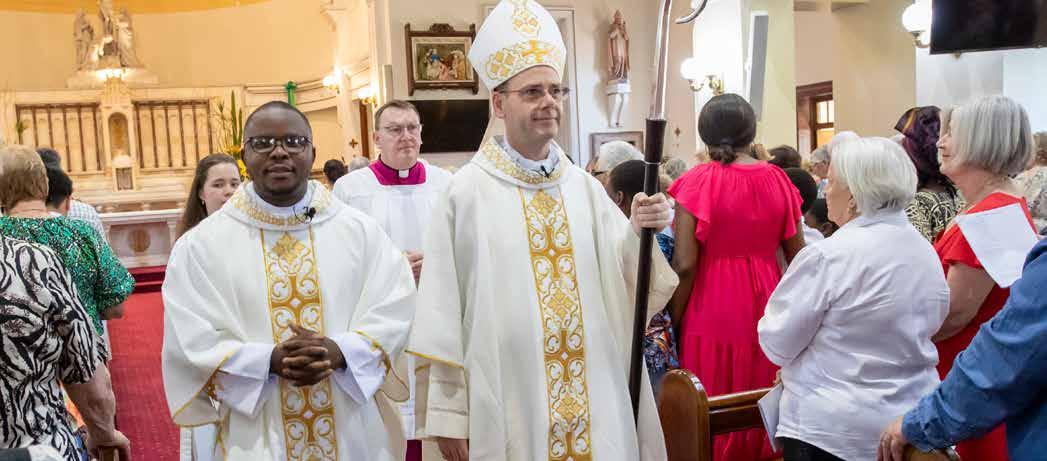
We live with much uncertainty about the future. For all the plans we make and all the prayers we pray we still do not know with certainty what will happen tomorrow – or even this afternoon! Some people choose to be optimistic about the future, adopting a positive mindset calculating that “the glass is half full” so “It’ll be alright.” I believe such optimists are better off than pessimists, for whilst they might at times suffer disappointment, they are spared from much needless worry.
Beyond the categories of optimism and pessimism, there is also hope. One of the good things about hope is that we can all possess it, optimists and pessimists alike. Another good thing, Saint Paul tells us, is that “hope does not disappoint” (Romans 5:5). That’s because hope is not based on human calculations, nor does it require the person to have a rosy outlook. Rather, Christian hope is grounded in the certainty that nothing and no one may ever separate us from God’s love: “who will separate us from the love of Christ? Hardship, or distress, or persecution, or famine, or nakedness, or peril or the sword?” (Romans 8:35)
Paul concludes that nothing in all of creation will be able to separate us from the love of God in Christ Jesus our Lord. (Romans 8:39). However bleak our situation might be, we can and will endure because God is with us, and the light will eventually return. And so, there is a beautiful interplay between God’s gift of hope and our own patience and endurance.
Every 25 years the Catholic Church celebrates a Jubilee Year. This year is the two thousand and twenty fifth Jubilee anniversary of the birth of Jesus Christ our hope. Pope Francis has given our Jubilee Year the theme ‘Pilgrims of Hope’. He said “Everyone knows what it is to hope. In the heart of each person, hope dwells as the desire and expectation of good things to come, despite our not knowing what the future may bring … For all of us, may the Jubilee be an opportunity to be renewed in hope.” (Spes non confundit 1)
As well as being renewed in our own hope, Pope Francis is encouraging us this year to be “tangible signs of hope” for those of our brothers and sisters who experience hardships of any kind. He
mentions: People suffering because of war; prisoners; young families; migrants; the sick; the elderly; and the billions of people who are poor and hungry which he says, “is a scandal, an open wound on the body of our humanity.” (Spes non confundit 16)
To people without hope, we “may be able to offer a smile, a small gesture of friendship, a kind look, a ready ear, a good deed, in the knowledge that, in the spirit of Jesus, these can become, for those who receive them, rich seeds of hope.” (Spes non confundit 18) Of course, when another person’s need is great and our own resources are ample, we are obliged to move beyond small gestures and do something more substantial.
Pope Francis also reminds us of the link between hope and forgiveness. “Forgiveness makes possible a brighter future … It cannot change what happened in the past, yet it can allow us to change the future.” He hopes that the Jubilee year will be a time when we will each have our own sins wiped away in the sacrament of Reconciliation and a time when we open our hearts to forgive
others in turn. (Spes non confundit 23)
Whatever the future may hold, ultimately, Pope Francis explains, hope provides us “the certainty that the history of humanity and our own individual history are not doomed to a dead end but are directed to an encounter with the Lord of glory. As a result, we live our lives in expectation of his return and in the hope of living forever in him. (Spes non confundit 19)
I may not know what will happen this afternoon, but I know that one day I shall stand before God’s judgement for which Pope Francis says “we should indeed prepare ourselves consciously and soberly … but always from the standpoint of hope … The judgement of God who is love will surely be based on love, and in particular on all that we have done or failed to do with regard to those in need.” (Spes non confundit 22)
The future can be daunting, but with hope we can face it peacefully and joyfully, whatever our circumstances.
May we each take active steps in this Jubilee Year to grow in hope and to offer seeds of hope to others.
FUN FACTS ABOUT AURORA
• Aurora was preceded by The Catholic Sentinel, the Catholic Diocese of Maitland-Newcastle’s monthly newspaper that was founded in 1931. It stopped publishing in 1968.
• ‘Aurora’ is a Latin word, meaning dawn. It suggests light, hope and new beginnings.
• The name ‘Aurora’ was coined after a competition was held across the Hunter, Manning, Port Stephens and Lake Macquarie area. There were 130 entries with ideas to name the publication.
• Aurora has travelled all over the world! Not just Australia, it’s been spotted in hundreds of locations, including Milan, the Eternal City, the Dead Sea, Fiji and Las Vegas over the years.
• There have been three Jubilee Years during the publication of Aurora. This includes Pope John Paul II’s Jubilee of the Year 2000, Pope Francis’ Year of the Jubilee 2016 and Pope Francis’ Year of the Jubilee 2025.
• Aurora has won a number of national awards through the Australian Catholic Press Association and the Australian Religious Association, including Best Regional Publication.

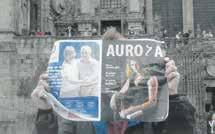
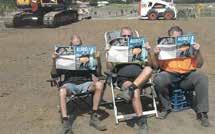
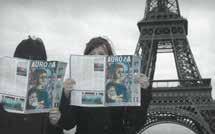

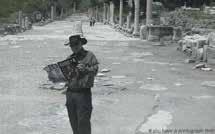
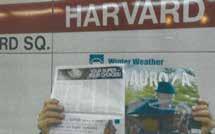
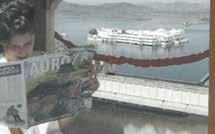

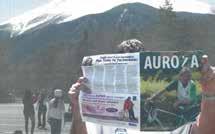


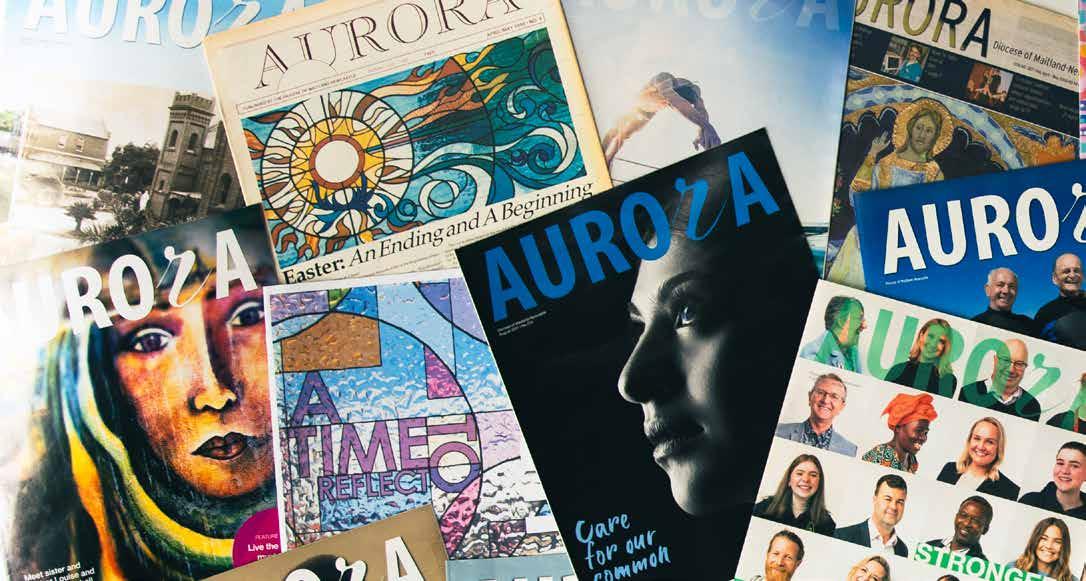

DECEMBER 1996
First issue of Aurora published

FEBRUARY 2005
50th edition of Aurora
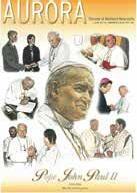
APRIL 2005
Special edition following the death of Pope John Paul II

JULY 2011
The installation of Bishop Bill Wright to the Catholic Diocese of Maitland-Newcastle
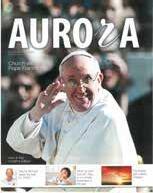
APRIL 2013
Welcoming of Pope Francis I
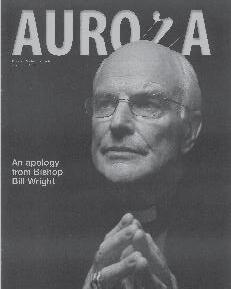
JULY 2013
A public acknowledgement and apology from Bishop Bill Wright

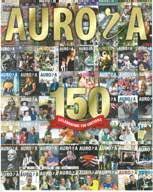
SEPTEMBER 2015
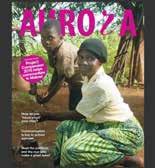
150th edition of Aurora FEBRUARY 2016
First edition of Aurora digital publishing
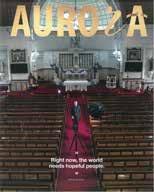
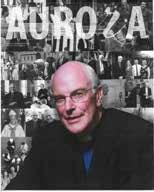
APRIL 2020
The COVID pandemic DECEMBER 2021
Death of Bishop Bill Wright
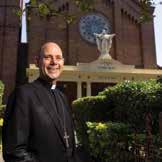

MARCH 2023
The installation of Bishop Michael Kennedy to the Catholic Diocese of Maitland-Newcastle
MARCH 2025
Aurora’s next chapter
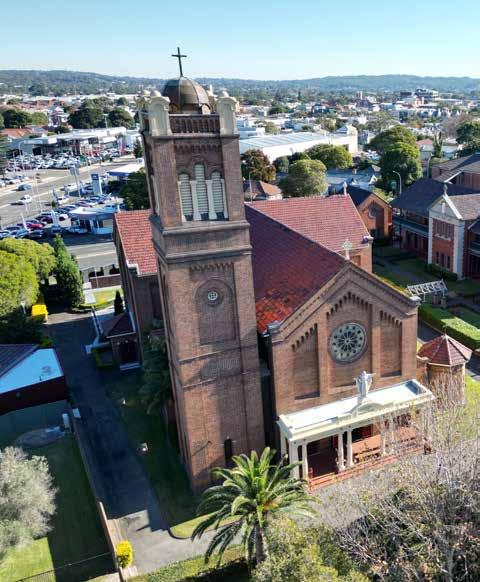
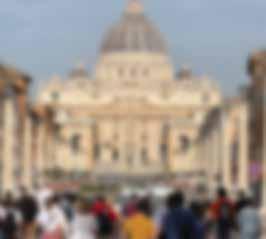
Bishop Michael Kennedy is inviting all communities of the Diocese to come along with their flags and banners as we celebrate the launch of the Jubilee Year on 2 March.
It begins with a pilgrimage walk from Foreshore Park all the way to Sacred Heart Cathedral (4km) at 8am with Bishop Michael Kennedy – our chance to be Pilgrims of Hope! Following this, you’re invited to a family festival of fun, free food trucks and ice cream, amusements,
Congratulations to Peyton
Congratulations to Year 12 St Joseph’s Catholic College Lochinvar student, Peyton, who has been selected to represent Australia at the Global Amateur Showjumping Tour in France.
Peyton will be heading overseas in July to compete in this international competition.
Congratulations, Peyton! The Catholic Diocese of Maitland-Newcastle wishes you the best of luck.
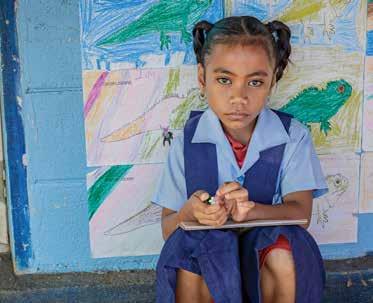
entertainment, and an obstacle course taking over the Cathedral Precinct.
This event doubles as our Launch of Project Compassion and collection of resources for this year’s campaign.
For more information visit QR code

Mission and EvangelisationRegister for NATSICC
Every three years, the National Aboriginal and Torres Strait Islander Catholic Council (NATSICC) hosts a National Tri-Annual Assembly.
In 2025, the Catholic Diocese of Maitland-Newcastle is honoured to host this gathering on the lands of the Wonnarua people at Rydges Hunter Valley from Monday 29 September to Friday 3 October 2025.
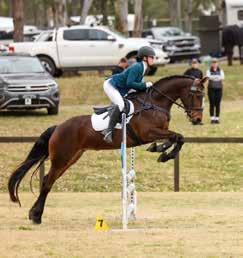
The Catholic Diocese of MaitlandNewcastle will be launching the Caritas Australia 2025 Project Compassion appeal for schools and parishes on Sunday 2 March 2025 following the Diocesan Launch of the Jubilee Year.
For more information email mission@mn.catholic.org.au
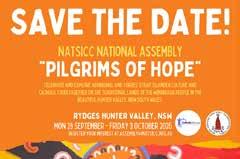
For more information or to register your interest scan the QR code

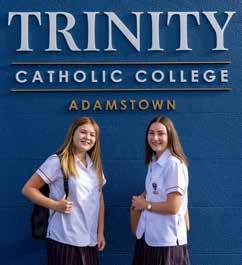
Scriptwriting and songwriting for ASPIRE
ASPIRE is introducing a scriptwriting competition in 2025 for secondary students. Interested creative writers are encouraged to get writing and enter a script to go through a shortlisting process.
The ASPIRE Song Writing Competition is open to all students in our primary and secondary schools. ASPIRE 2025 is set in a post-apocalyptic future where young people are not allowed to feel any emotions. When mysterious artworks start appearing around the city questioning this course of action a small group of rebels are inspired to challenge the decisions of their leaders.
A new name, new uniforms, and new senior space awaited the first Year 11 cohort at Trinity Catholic College, formerly St Pius X High School, as they walked into their first day back.
The school started its transition to a Year seven to 12 school this year, while also introducing their new visual identity.
To see Trinity’s first day, visit QR code


For more information email aspire@mn.catholic.edu.au
This year’s Diocesan Pilgrimage will take place from 25 September to Sunday 12 October 2025 and will see pilgrims embark on a 20-day pilgrimage tracing the footsteps of St. Paul and other revered saints, visiting pivotal biblical sites across Greece, Turkey, and Italy.
From the ancient wonders of Athens and Corinth to the spiritual heights of Meteora and the holy grounds
40 years of St Joseph’s Kilaben Bay
St Joseph’s Kilaben Bay celebrated their 40th anniversary on Wednesday, 19 February by welcoming all school and parish members to an evening starting with a liturgy in the church, followed by opportunities to gather, explore memorabilia displays, listen to stories from the past, and enjoy fun activities. Students were able to enjoy face painting, a petting zoo, and a magic show.
Congratulations to St Joseph’s on this wonderful milestone!
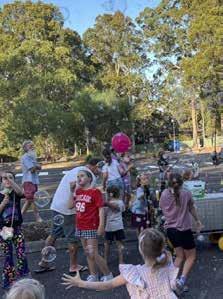
of Ephesus, each location offers a unique opportunity for deep spiritual reflection and connection to our rich Christian story.
The pilgrimage culminates in Rome during the Jubilee Year, where pilgrims will experience the grace and blessings of the Holy Door at St. Peter’s Basilica, uniting in faith and community.
Applications to attend close on Friday 14 March.

For more information visit QR code
To read more Catholic news from across the Diocese of MaitlandNewcastle and around the world visit www.mnnews.today or scan the QR code below. There, you will also find links to upcoming events, important dates for your diary and to live stream Sunday Mass from Sacred Heart Cathedral.

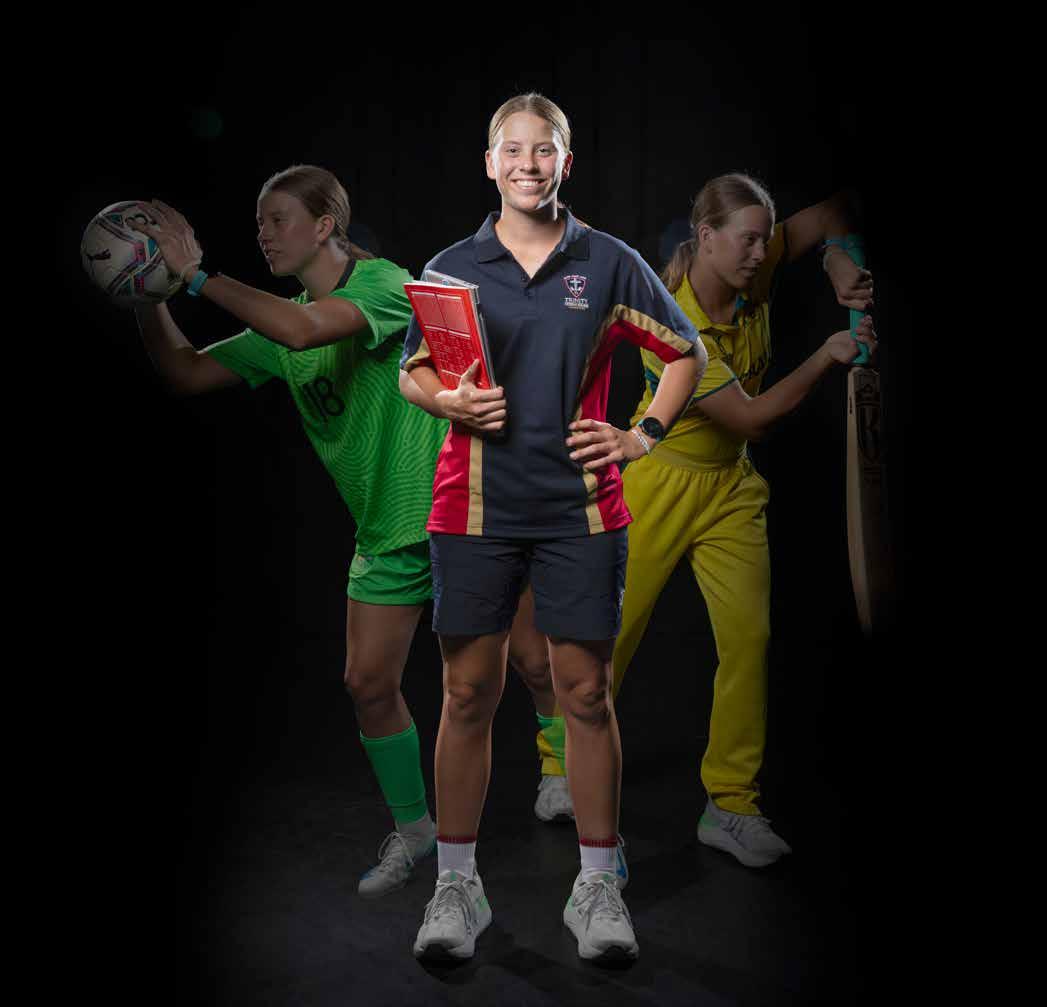
"
I was looking back at a PowerPoint I made in Year 4, and in it I said I wanted to play cricket and soccer for Australia. When I saw that, I started tearing up... It’s just so incredible to think I’m doing it now!
"
BY TIAHN PESTEREY
How many 15-year-olds can say that they’re actively living out their wildest dreams?
“I was looking back at a PowerPoint I made in Year 4, and in it I said I wanted to play cricket and soccer for Australia. When I saw that, I started tearing up... It’s just so incredible to think I’m doing it now!”
These are the words of Caoimhe Bray, a Year 10 student at Trinity Catholic College, a normal teenager, who happens to also be making a significant mark on both the cricket and soccer world stages.
Her most recent accolades include making history as the youngest player to debut for the Sydney Sixers in the Women’s Big Bash League (WBBL) and delivering a standout performance while representing Australia in the ICC Under-19 T20 World Cup.
Despite all of her successes, she balances elite level soccer and cricket along with school life and an undeniable aura of humility. Minutes in her presence shows she is poised for a future as bright as it is extraordinary.
“I feel like I'm still in the under eighteens playing Brewers down in Sydney. Making bigger teams is obviously a cool opportunity, but I still think of myself as just a 15-year-old girl that goes to school, has friends, and just plays sport on the other side of it,” Caoimhe said.
Growing up in Denman, Caoimhe, like many other country kids, eagerly joined community sports and school teams. Former St Joseph’s Primary School principal, Aaron Moon, fondly recalls reaching out to Caoimhe’s mother after noticing a shortage of girls on the town's Under 10's cricket team.
“We only had one girl on the team, and
we needed more. Caoimhe was always full of energy and loved being active, so I called her mum and said, ‘Hey, how about Caoimhe plays cricket? We could really use more girls on the team.’”
Within just a few months, at only eight years old, Caoimhe was already outplaying the boys.
It was evident she had natural talent, however Caoimhe believes it was her mindset that truly made soccer and cricket stick.
“I’m the type of person who, once I start something, I don’t stop. I keep pushing forward, no matter what,” she said.
“I did all my community-level cricket and soccer in Denman and Muswellbrook. It’s where I started, and the community have always been big supporters of me. When I played in the WBBL, about 50 of them came down to watch which was really sweet.”
After years of commuting with her mother between Denman and Newcastle for training, Caoimhe’s family made the decision to move to Newcastle last year. The move not only offered her new opportunities but also led her to Trinity Catholic College, where the school has backed her the entire way.
“They really understand my commitments and are so supportive of my sport,” she said.
“Even when I miss school for games or training, they’re always encouraging me and making sure I’m keeping up.
“It’s such a warm, welcoming school, and I really feel at home here.”
Though she’s only been a part of the Trinity community for a year, it’s clear that Caoimhe’s joyful, positive, and humble nature has already made a lasting impact on those around her.
Trinity Catholic College Sports Coordinator David Pitfield said Caoimhe’s dedication to school sports has been nothing short of remarkable.
“Last year, she represented our school in AFL, Athletics, Basketball, Football, Oz-Tag, Rugby League, and Touch. Her passion, positive attitude, and sportsmanship have inspired her teammates and lifted their spirits. She is an incredible role model,” David said.
Principal Robert Emery said the school is incredibly proud to celebrate Caoimhe.
“She has shown exceptional skill and dedication on the field, but she also embraces the values of teamwork, leadership, and resilience. Her kind and uplifting attitude has had a profound and positive impact on our whole school community,” Robert said.
The past couple of months have been a whirlwind for Caoimhe, with ‘loads of cricket and just a little less soccer.’
Having only recently returned from Malaysia, she’s soaking up the chance to relax with her family and dog, catch up on schoolwork and strum a few tunes on her guitar.
Being in the spotlight at such a young age certainly comes with its pressures, but Caoimhe handles it with a level of maturity well beyond her years.
“I feel more pressure when playing against people my own age, but even in the WBBL and open age groups, I still get nervous.
“It’s all about taking it one game, one training session at a time. If you’ve done it once, you can do it again,” she said.
Looking ahead, Caoimhe is laserfocused on what’s to come.
“Over the next five years, I just want to
continue performing. I’d like to get into Australia A for cricket and the Under 20's Matildas for soccer.”
“In 10 years, I’ll be 25, so I’ll probably have chosen one sport by then. My goal is to be part of the senior side—either the Australian Women’s Cricket Team or the Matildas soccer team.”
Whilst sport is her passion, Caoimhe is also thinking about what life after sport might look like for her.
“I love the idea of commentating. I see a lot of cricketers doing it, even while they’re still playing. It’d be a fantastic way to stay connected to the game.”
“I have these big plans; but at the same time, I want to make sure I always continue enjoying the ‘now’,” said Caoimhe. “I’m just trying to make sure I focus on being my best. I’ve got to where I am by doing that and pushing myself. It hasn’t been about the big teams or titles, it’s been about showing up and giving it my all.”
She might have the world at her feet, but the country kid from Denman will always appreciate the love and support she’s received from home.
“I’m so thankful for my mum. All the driving she’s done for me over the years from Newcastle to Denman, to Sydney and across states. I can’t even imagine how many hours she’s spent in the car with me. She’s done so much, and I don’t think people realise just how much she’s given up,” she said.
“I am so excited about the future and all that’s to come. But it’s all started here with my family, my friends, my school and my community, both in Newcastle and Denman. I’m always going to be so grateful for that.”
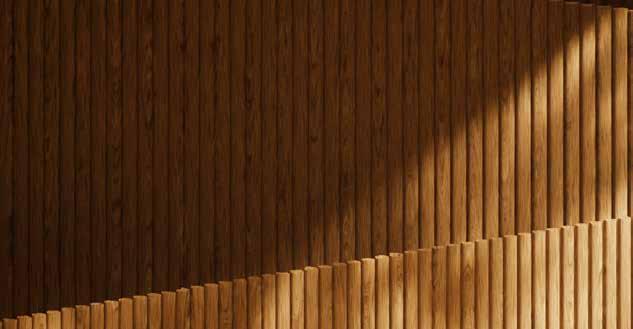
Music is actually the last memory that we lose, so people who have got quite advanced dementia can still remember songs. It is a wonderful and inspiring thing to see
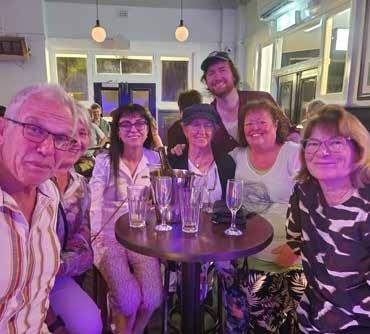
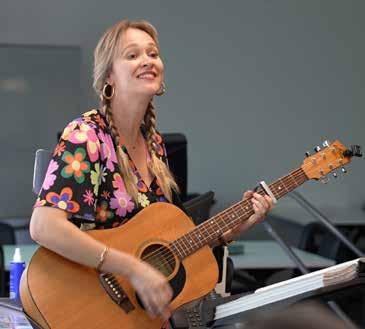

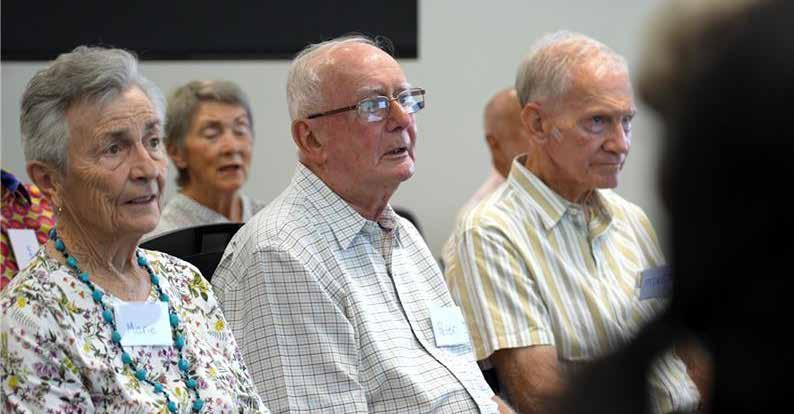
According to Dementia Australia, there are an estimated 433,300 Australians currently living with dementia.
Without a significant intervention, the number of people with dementia is expected to increase to an estimated 812,500 by 2054.
For more information about Dementia, please visit dementia.org.au
BY ELIZABETH SYMINGTON
It’s so much more than a choir.
That’s the sentiment I took away from my visit to The Unforgettables – a choir that’s using music to help people with dementia.
They come together once a week for rehearsals, but the impact of the group goes far beyond the music room.
All Saints' Blackbutt South parishioners of the last five decades, Peter and Marie Cunningham have been part of the choir since it began in 2023.
“It is fantastic, we go away from here every Saturday afternoon just feeling so uplifted after being here for a couple of hours,” Peter explained.
“We are meeting people in the same situation as us and that is comforting, [it is good to know] we are not one-offs in the community and the joy we get from the singing is helping us as well.”
Marie was diagnosed with dementia in 2008 and while her decline has been very slow, it has started to accelerate over the last 12 months. Peter said things like the choir bring them joy and comfort during what is an emotional and testing journey.
The pair have known each other for most of their lives, clocking up 58 years of marriage. This is one of the harder things they have faced.
“It’s a bit of a strain on both of us,” Peter said.
“We are so grateful for the choir. We might have been just sitting at home twiddling our thumbs on a Saturday afternoon and we are not doing that anymore.
“The choir group is a community; it’s like a family.”
Participants in the choir stay in touch through a WhatsApp group chat where they check in on each other and share information to help everyone through their journey.
For creators, University of Newcastle Associate Professor in Music Helen English and Associate Professor in Clinical Psychology Michelle Kelly, the choir has turned into something so much more than they could have imagined.
“It is just amazing, it is one of the best, if not the best thing I have ever done as part of my role at the University of Newcastle,” Michelle said.
“It definitely sits outside of what we would normally do, my job is predominately teaching about dementia and doing research, so it is such a joy to come here, such a privilege to get to know these people and see how they support each other.”
“I’m proud of how this group has come together, it is a really lovely supportive community, well beyond just coming together to have a sing and a cup of coffee.”
Helen and Michelle both confirmed that music is incredibly powerful for people living with dementia as it can often evoke memories.
“Music is actually the last memory that we lose, so people who have got quite advanced dementia can still remember songs. It is a wonderful and inspiring thing to see,” Helen said.
“It is special for carers to kind of get their loved one back for a short time.”
For Peter, the impact of music is obvious to him and Marie, but he also noticed it through a story from his sibling.
“My brother has a friend with dementia, and he is non-verbal but if he hears a song that he knows, he starts singing it,” he said.
Catholic Diocese of Maitland-Newcastle Director of Mission and Evangelisation, James Camden, reinforced the significance of music, noting that it's played a pivotal role in offering community, connection and spiritual expression in the Church for centuries.
"Music has always been at the heart of the Church’s tradition, bringing people together in worship, reflection, and shared experience. In The Unforgettables, we see that same power at work—offering those living with dementia and their carers a source of belonging, comfort, and joy. It is a reminder that even when words fade, the language of music remains," he said.
Music therapist and founding conductor Stephanie Tuyl encourages anyone who is interested to get involved.
“I want to emphasise how important the sense of fun is, we don’t take ourselves too seriously and everyone is welcome,” she said.
“It is a real highlight to spend time together and it is so inspiring seeing the special moments created during rehearsals.”
The future goal for the team is to expand and create choirs in other areas across the Hunter so it is more accessible for people.
They know that music is powerful and want to share the benefits with as many people as possible.
To do this, they need our help. If you or your local parish have space, time, or talent to offer, please reach out by emailing helen.english@newcastle.edu.au
To see the choir in action or learn more about the group visit QR code

BY MADIE LEEMING
Strength through difficulties is the motto for St Joseph’s Catholic College in Lochinvar.
They’re also the words Liam Woods held onto during his darkest days.
An alumnus of St Patrick’s Primary School Cessnock, St Joseph’s Catholic College Lochinvar and All Saints’ College Maitland, Liam’s journey with faith was tested in 2014 when he was diagnosed with an aggressive form of leukemia at 27.
“I was tired, so I went to the doctor,” he said. “I had a 15-month-old daughter, and my wife, Amanda, was seven months pregnant with our second child. I thought juggling work and family was why I felt rundown. But when the doctor walked in holding a file stamped ‘URGENT’ I knew something was wrong,” he said.
What followed was months of hospital stays, multiple rounds of chemotherapy, and a frantic search for a bone marrow match so Liam could receive a lifesaving transplant.
“We found close matches in the family, but not full matches. I had a rare diagnosis of leukemia, and I needed a perfect match to make things work,” he said.
A worldwide search led to a woman in Nashville, Tennessee. Liam’s nurses had just 48-hours to collect her bone marrow and fly it back to Australia for the transplant surgery.
“By then, our second daughter had arrived, but then I couldn’t see my family for three months because my immune system was so compromised,” he said.
Liam was given a 50-50 chance of survival. Without the transplant, his odds dropped to just 13 per cent.
“There was a time I didn’t think I’d see my girls grow up. I wrote them letters… just in case I didn’t make it,” he said.
Amid the battle, he wrestled with his faith.
“It’s a strange thing to grapple with. I had been to Catholic Schools my entire life, but you can’t help but wonder, as you’re going through something as horrible as cancer, why is this happening to me?
“It makes you question everything.
“But then, at the same time, I had the foundation of ‘strength in difficulties’ which I really drew inspiration from. I had support from my mates who I met at school, the backing and fundraising
support from the Catholic community, the parish rallying behind not only me but also my family to make sure they were doing alright too… there was so much to be grateful for.”
Nine months in hospital took its toll physically, mentally and emotionally, but when Liam was discharged – 20 kilograms lighter – he was determined to find a new normal.
“I’d be completely out of breath after walking 10 metres. I had always been sporty, so this was a big shock to the system.
“The mental battle that came with that, along with feeling like a burden on Amanda and worrying about the financial burden of supporting my family… it was a hard 12 months.”
Fast forward one year, and Liam had
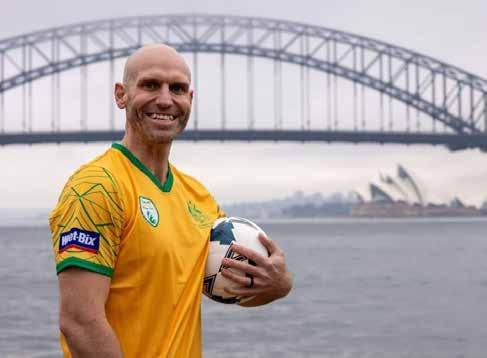
beaten cancer. He was on his way to brighter days.
It’s been nearly a decade since then and Liam is happy, healthy and determined to raise awareness about cancer and the needs for transplant donors.
In 2023, he joined the Australian soccer team at the World Transplant Games in Perth and took home the gold. In 2024, he captained Australia at the Transplant Football World Cup in Italy.
“These games remind us of who we are and what we can still achieve,” he said. His hope is these games continue to generate awareness and make people think about donating organs, tissues and cells.
“People are unaware of the process to actually become a donor. It’s not on
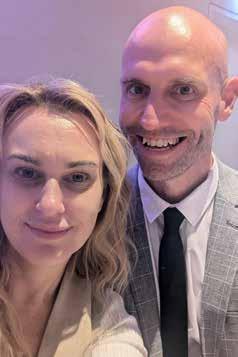
your licence anymore and you need to become registered through Medicare or DonateLife. It’s a separate system again to be a stem cell donor. It isn’t straightforward and I want to get the message out that it needs to be simplified” he said.
Beyond advocacy, Liam said the Games proves there is life after transplants.
“We might avoid slide tackles because of kidney and liver transplants, but we can still compete. We can still push ourselves.
“And the best part? The community. We share stories, we understand each other in a way no one else can. After cancer, you take life day by day, and we all just want to make the most of the time we have.”
Liam is doing just that.
This year, he was named Citizen of the Year at the Cessnock City Council’s Australia Day Awards for his work with The Leukaemia Foundation, Stem Cell Donors Australia, and Transplant Australia.
Now, he is preparing for the 2025 World Transplant Games in Dresden, Germany.
“I want my daughters to know that no matter the setback, you can always come back to who you are.
“Transplant recipients aren’t defined by their illness.
“I’m grateful to my donor for what she did for me. And I’m determined to use my second chance to make a difference,” he said.
“Strength in difficulties. It will stay with me forever.”
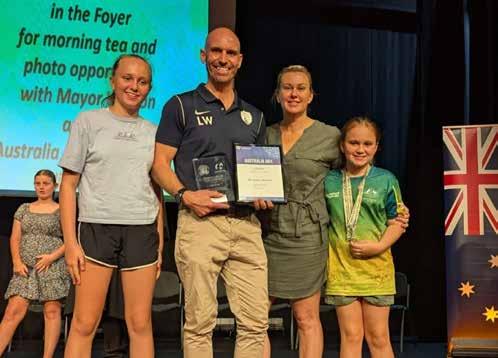
According to Transplant Australia:
One organ and tissue donor can transform the lives of 10 or more people.
Australia is a world leader for successful transplant outcomes, but we still have a long way to go.
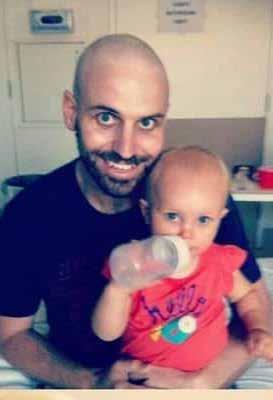

Around 1,850 people are on the transplant waiting list at any one time.
In 2021, 421 deceased organ donors and 203 living donors gave 1,174 Australians a new chance in life.
The majority of Australians are generally willing to become organ (76%) and tissue (76%) donors.
Less than 1% of people die in hospital in the specific circumstances where organ donation is possible.
In Australia the family of every potential donor will be asked to confirm the donation decision of their loved one before donation can proceed.
In 2021 56% of families gave consent for organ and tissue donation to proceed.
We encourage all Australians to register their donation decision on the Australian Organ Donor Register and to discuss their donation decision with family members.
BY SEAN TYNAN
I believe that an injustice has been developing, in the wake of attempting to address an earlier, greater injustice.
During much of the 20th century, countless children suffered abuse at the hands of adults who were entrusted with positions of authority over them. Some of those who were abused suffered enduring, even lifelong psychological injury.
I have been working on ‘abuse claims’ at the Diocese since 2010. Many courageous victims and survivors have fought for a more just and equitable response for past abuse and current harm, from government and institutions. I have met with hundreds of men and women and been privileged to bear witness to their courage and to listen to their truths. In my earlier years, there was only a very small percentage of claims where there were significant doubts about the voracity of the claim.
Fast forward to today and things have changed. I believe there have been significant changes in the nature of personal injury compensation claims related to institutional child abuse. I believe there is widespread fraud attempting to be perpetrated against religious, community and state institutions, under the guise of claiming to be child sex abuse survivors. I note the recent arrests of multiple persons by New South Wales and Queensland Police for alleged fraud.
In the following paragraphs you will find the story of John, who is a construct created from several claims in which I have been involved. While John and all the people referred to in telling his story are fictional, the issues discussed are real and they are happening now, in our Diocese and, I believe, many other institutions across our society.
John is an employee of the Catholic Diocese of Maitland-Newcastle, who works with children in a youth outreach program. He is married, he has two adult children and most recently, he become a grandad.
He’s reaching the end of his career and looking forward to a modest yet comfortable retirement. He feels he’s had a good career and built a nice life with his family. He’s never been the subject of any serious complaints and no allegations of being abusive towards children.
Last year, the Diocese received a letter from a legal firm representing a man called Mike, who is serving a custodial sentence in a NSW correctional facility. While in prison, a ‘claims farmer’ approached Mike to ask if he had
ever been abused at school or whilst receiving services from an institution, and that if he did, he could help Mike connect with lawyers who could get him financial compensation.
Mike is a mid-30’s man who alleged child abuse while he was in a youth welfare program. Mike doesn’t remember the alleged abuser’s name, but he can remember where it happened and roughly when, along with a generic description of an adult male who he alleges abused him.
A claims process began.
We learnt that Mike had a long involvement with Police and Corrective Services, he had been the subject of several psychological and other assessments and underwent a period of counselling for drug
addiction. In these extensive medical and criminal records, there was no previous mention of his alleged institutional abuse.
The Diocese understands and accepts that complex childhood trauma may lead to disrupted and marginalised lives. However, it’s challenging to accept that an individual who has been assessed on multiple occasions and been in a period of counselling, had never given any indication that he had suffered abuse. Especially considering any alleged abuse would be part of his sentence hearing in court and his placement assessment in Corrective Services, possibly resulting in a reduced custodial sentence and other special considerations. It would be in Mike’s best interests to

To hear more visit QR code

disclose his abuse but he did not do this.
As the claim progressed, Mike’s solicitor gathered more information, until Mike was able to identify his alleged abuser, who he claimed was John. Records showed that John was one of the senior youth workers in the outreach program when Mike attended.
The Diocese notified the Police of Mike’s allegations against John, and after some time, we learnt that there would be no criminal investigation of the allegations – because Mike refused to make a Police complaint.
I recognise there’s many legitimate reasons someone who has been abused might choose to forego an attempt to get justice for the harm inflicted on them, such as having to relive the trauma of the abuse or having to give evidence in court. What I find difficult to accept is when one may be prepared to go to court to get compensation from the institution they say failed them, yet refuse to seek justice against the man they alleged abused them.
In the case of Mike and John, an investigation was carried out by the Office of Safeguarding which is oversighted by the Office of the Children’s Guardian, ensuring it is rigorous and sound.
As part of this, one of the first things the investigator tries to do is to talk to the alleged victim. When approached for questioning, Mike refused to participate in the investigation. Regardless, the investigation proceeded even though the alleged victim did not cooperate.
As part of the investigation John was given the allegations against him and he emphatically denied them.
After an extensive investigation,
including speaking to people who worked in or attended the programme at the time of the alleged abuse, as well as people who remembered both John and Mike, the results showed no merit in Mike’s allegations.
John was cleared to continue his career; however, the investigation had been deeply challenging for him.
Even before identifying John, Mike had lodged his claim in the NSW Supreme Court. Given the allegations of abuse had been determined to have no merit, the Diocese and the Diocese’s insurer were not prepared to resolve the claim by negotiations. This meant the matter would go to trial, with the Diocese as the sole defendant.
Leading into the trial, Mike’s lawyer made the decision to list John a co-defendant in the claim, meaning John must engage his own legal team, costing him tens of thousands of dollars.
In addition, Mike would likely be granted a non-publication order, protecting his identity from the public. It is highly unlikely that John would receive similar protection.
Nobody knows how a trial will end.
If a judge rules in Mike’s favour, John’s assets are in jeopardy. His house, his savings, his investments, even his superannuation, could all be at risk.
If the judge rules in John’s and the Diocese’s favour, there will be no payment to Mike or his lawyers, but John and the Diocese’s insurers do not automatically receive any reimbursement for the costs of successfully defending themselves.
So, for John, a ‘good’ outcome will be a legal bill for tens of thousands of dollars and that neither the professional news media nor some citizen journalist notices
that he is listed as a co-defendant in a sexual abuse claim.
How many families can afford an unplanned expenditure of $50,000 or more? How would you feel living with the knowledge that you and your family may be publicly identified as an alleged abuser?
John has stopped planning for his retirement. John and his wife are not socialising as much as they used to, increasingly withdrawing from their circle of friends and community activities. John’s life, and that of his family, have been irrevocably affected, and the once-promised comfort of a well-earned retirement seems to be slipping away. And all of this is happening in a context where the available evidence supports the belief that John did not abuse Mike.
So, what needs to happen to address this situation?
As a system, I believe we have gone from a time when it was extraordinarily difficult to sue institutions for their culpability in the abuse crisis. That was wrong, it needed to change, and it did. However, human systems tend to overcompensate. We need to bring back greater balance, without risking disempowering legitimate victims and survivors who are seeking compensation for the harm that was inflected upon them.
First and foremost, support the NSW Government’s legislation to outlaw claims farming.
Further, I believe there needs to be some consideration of the apparent imbalance of financial risk that weighs on individual defendants as well as more equitable protection of their identities from the public.
For the last quarter century, the media has reported on the injustices of institutional abuse, rightly so. However, I believe a presumptive bias has developed in the media and is still being applied. The Church’s intent is automatically suspect whilst victim/survivors and their advocates’ assertions are reported without any critical consideration. We need a more balanced reporting of the issues, a more nuanced dialectic than is currently delivered by our news media, so that the injustices visited on people like John are reported on and the community becomes aware of what is happening.
The Diocese, along with government departments, community agencies and other religious institutions, are facing a flood of claims, many of which, when examined, raise serious and persistent questions about their credibility. The most blatant aspect of this emerging industry is a practice known as ‘claims farming’. Mike’s case is an example of claims farming, when a ‘claims farmer’ makes unsolicited contact with a person and asks them if they have a personal injury claim to pursue and encourages them to do so through a law firm that usually pays the claims farmer for the business.
Claims farming has become such a serious issue in NSW that the state government is in the process of developing legislation to outlaw it. Queensland has already made claims farming illegal, Western Australia and South Australia are well on the path to do so as well.
BY JANINE CURTIS
As a global citizen, how sustainably responsible are you?
Do you switch off lights when leaving a room?
Do you separate your waste from recycling?
Do you think twice before printing documents?
Do you limit water usage as much as possible?
These are the kinds of questions the Catholic Diocese of Maitland-Newcastle now considers through its daily work. And it is these small changes that are having big impacts across our region. Sitting down with Diocesan Sustainability Manager Drew Ashworth, he spoke about the significant milestones achieved since the inception of the Diocese’s 2022-2025 Sustainability Plan. The foundation for the Plan is a message from Pope Francis calling on us to
care for our common home by making environmentally conscious decisions.
“Given our Diocese’s footprint, a simple shift in mindset can significantly impact the environment,” Drew said.
As an organisation with 5,500 staff across six distinct agencies and 10 local government areas, even the smallest of changes results in substantial impact.
“As an example, the Diocese undertook a school holiday energy reduction initiative where schools shut down all non-essential equipment over the break such as printers, smartboards and computer screens that would have ordinarily stayed on. The result was an average of 15% energy reduction across our 58 schools for the summer school holiday period.”
Alongside these successes, there have been some larger sustainability projects that Drew highlighted.
Soon, close to 90% of eligible Diocesan sites will have solar panels installed, a remarkable feat for an organisation of this size – this includes 58 Catholic primary and secondary schools, 12 St Nicholas Early Education centres,
numerous offices, administrative buildings, and even the Diocesan library.
“The installation of these solar panel systems dramatically reduces our reliance on sourcing power from the grid. From time to time, we might not be able to generate the entirety of the energy needed. In this event, we lean on external providers who use 100% government certified renewable energy sources, such as wind or their own solar systems,” he said.
Plans are now well underway for the next Sustainability Plan, set to commence in 2026, with a focus on measurable changes.
“By establishing baseline data, we can set realistic targets and show measurable results regarding our progress. This allows us to be more accountable and prepares us for forthcoming changes to government reporting requirements,” Drew explained.
“An example is our new waste services contract, currently in the procurement phase.”
“We are engaging a waste services contractor who will
provide real-time data about our waste usage and recycling efforts. This knowledge empowers us to achieve real, measurable progress.”
There will be also an increased focus on education, extending from the children at St Nicholas and our primary and secondary school students, through to staff and the communities we work within.
“I’m excited that the Tiny Forest initiative, which commenced with the inaugural Tiny Forest being planted at St Paul’s Catholic Primary Gateshead last year, will expand,” Drew said.
“These compact, densely planted forests are created to increase biodiversity in urban ecosystems and it’s great that discussions are taking place to roll this initiative out in other schools across the Diocese.”
Looking ahead, Pope Francis’ message for us to care for our common home will continue to inspire the Diocese’s next Sustainability Plan from 2026 onwards. It is an opportunity to make us all consider, ‘what small changes can we make that will collectively have a big impact on our world?’
BY FIONA DUQUE
Lent begins on Ash Wednesday and ends at sunset, with Mass, on Holy Thursday. It is a 40-day time of prayer, fasting, and giving to the poor that helps Christians prepare to celebrate the Lord's Resurrection at Easter. It is a time of reflection, repentance, and transformation. A time to make right with others and God.
Rather than fasting or giving up something for Lent, more and more often the focus has become that of a conversion of the heart as Christians try to become more like Christ, and give up the behaviours that are not life-giving to others. Therefore, ‘fasting’ could include such things as sharing your time and gifts with others and donating money where it is needed – being bringers of hope to others.
Hope is a powerful force, and when it's lacking, it can truly stifle dreams and aspirations. Addressing this deficit of hope is essential for fostering a society where dreams can flourish, and voices can be heard.
In the lead up to 2025, which is a Jubilee Year, Pope Francis designated 2024 a Year of Prayer. This year of prayer was to encourage people to focus on a prayer life that comes from

the heart. He wanted our hearts ready for a Jubilee Year, where we are to be pilgrims of hope.
This idea of pilgrimage is an active one. The idea that we put one foot in front of the other – it indicates we are going somewhere. So, where are we going this Lent?
This led me to thinking about Pope Francis’ message for Lent last year. It is titled Through the Desert God Leads us to Freedom. When we think of deserts, we often think of places that are dry and desolate. Our lives can be like this where we have ‘moments when we feel hopeless, wandering through life like a desert1. Moving from a desert place into a place of reflection offers an opportunity to focus on personal growth, spiritual renewal, and acts of compassion. By embracing the spirit of Lent, individuals can find new sources of inspiration and hope, which can collectively contribute to a more hopeful and creative society. How do you envision this Lenten journey impacting your community? Are there specific actions or initiatives you think could help foster this sense of renewal and hope?

ST JOSEPH’S CATHOLIC COLLEGE, LOCHINVAR
In a world where you can be anything, what do you want to be?
I think the very top dream would be to do cinematography, audio lighting or even set design – something that involves movies and television.
How do you plan to get there?
At St Joseph’s, I completed the VET subject for the entertainment industry where I received a statement of attainment towards a Certificate III for live production and technical services. So through that I got some skills in lighting and audio, but now with my Communications degree I want to flesh those skills out and learn more.
What is your hope for the world in 10 years’ time?
I think a world where there is just a lot of harmony. At the moment, there is a lot going on in the world – a lot of war and problems. I’d hope for a place that is really diverse, where everyone is just fine with difference.
What do you think success looks like?
I think it’s a feeling – like you are totally happy and content with where you are in your place in the world.









ST THERESE'S PRIMARY SCHOOL, NEW LAMBTON
In a world where you can be anything, what do you want to be?
Probably a football player.
How do you plan to get there?
Well, obviously training, training hard, just working on stuff that I might not be the greatest at.
What is your hope for the world in 10 years’ time?
To be, just a nice person. You know, respected by people.
What do you think success looks like?
First people think of money and you know, maybe respect from others but I think a nice person that just brings everyone together and like a problem solver to sort stuff out and someone who thinks outside of the box.


























CATHERINE McAULEY CATHOLIC COLLEGE, MEDOWIE
In a world where you can be anything. what do you want to be?
I want to be a person that is known for spreading kindness.
What’s your dream career?
When I graduate, I want to be a doctor, or I want to be a midwife. I've been set on that since Year 10.
What's your hope for the world in 10 years’ time?
This is a very big question. I’d like to have kids and play a big part in their life. I think I want the world to be more accepting for my kids.
What do you think success looks like?
I think success is different to many people. My idea of success is to be happy. Very happy, very fulfilled. Not necessarily a lot of money, but definitely well-travelled.















ST NICHOLAS PATHWAYS PROGRAM









In a world where you can be anything, what do you want to be?
I want to be an early childcare worker because I have a strong passion for working with children and supporting their development, and I'm eager to contribute to that growth in a positive and nurturing environment.
How do you plan to get there?




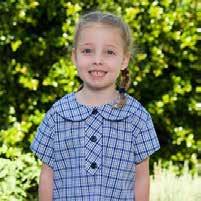

CATHERINE McAULEY CATHOLIC COLLEGE, MEDOWIE
In a world where you can be anything. What do you want to be?
I really want to be a mum – that sounds so generic but I’m so excited to have a family and be in my dream career and just be the best version of myself. Basically, I’d like to be giving back.
What is your dream career?

ST JOSEPH’S PRIMARY SCHOOL, KILABEN BAY
I want to go to university and get a degree in teaching – either early childhood or primary school, and right now, I'm also completing the Pathways placement as well.
What is your hope for the world in 10 years’ time?
One hope for the world in 10 years time is for early childcare workers to really deepen their understanding of early childhood development and gain practical experience in working with children.
I’d like to see that every child has the chance to have an education and go to early education centres and school.
What do you think success looks like?
Personally, I think success is seeing a child's growth and their development. Really just helping the child with their growth and progress and contributing to build my knowledge in schools and early childhood education.
ST THERESE’S PRIMARY SCHOOL, NEW LAMBTON
In a world where you can be anything, what do you want to be?
I want to be an artist, and I also want to be school captain.
How do you plan to get there?
My school buddy is captain so I can just follow what she does.
And with the artist plan, well I painted today at school and I am just interested in that. I painted a picture of a rainbow with stars in the sky at night time and Mrs Curtain helped me.
What would you like to see in the world in 10 years’ time?
A unicorn and a real fairy.
What do you think the perfect future would look like for you, for the world?
I’ll have three kids. Actually, we’ll have a castle built of mushrooms where my three kids will live.
My dream career is a real estate agent. It’s helping families and young couples find a place to live their best lives.
How do you plan to get there?
Well, I actually started yesterday at a real estate. I'm starting in property management and a little bit of sales and front desk. And when I finish school, they offered me a job so that will boost me into the career, which is so cool.
What is your hope for the world in 10 years’ time?
I feel like the world is so good right now, but I feel it can be better. Particularly with bullying for young kids. I don't want that to happen to my kids and their friends. So I hope that’s better.
What do you think success looks like?
Success will be when I have a family and just go to work, have a good day, come home and give back to my kids. Hope that they've had a good day, cook them dinner, and give everyone a big hug. A happy family, and they give back to my parents and stuff like that.
In a world where you can be anything, what do you want to be?
An astronaut.
How do you plan to get there?
Go to college.
What is your hope for the world in 10 years’ time?
Umm, humans live on Mars and I’m going to be in space.
What do you think success looks like?
Going to the moon.
To hear more visit QR code

BY FIONA DUQUE
What is a Jubilee Year?
Jubilees are wonderful celebrations of significant milestones. Catholic Jubilee Years encompass many practices and rituals – pilgrims undertake journeys to significant holy sites, there is the ritual opening of the Holy Door by the Pope, there is focus on reconciliation, forgiveness and healing as well as moments of reflection and strengthening of faith and beliefs.
Why does the Catholic Church celebrate Jubilee Years?
The establishment of the first jubilee or 'Holy Year' by Pope Boniface VIII in 1300 was a significant moment in history and continues to be so for the Catholic Church. The jubilee signifies a period of special grace and celebration. It's a call to serve with joy and to live in peace with one another, and the
opportunity for a deeper connection with God's grace.
When is it celebrated?
Within the Catholic Church, ordinary jubilees have generally been celebrated every 25 or 50 years, with extraordinary jubilees in addition depending on what needs there might be in the world. For example, Pope Francis called an Extraordinary Jubilee of Mercy in 2016. This year’s Jubilee started on 24 December 2024 with the Opening of the Holy Door of Saint Peter’s Basilica. It will finish on 6 January 2026 the Feast of the Epiphany, with the closing of the Door.
Why is pilgrimage an important aspect of the Jubilee Year?
The Jubilee Year is a profound year of grace, mercy and conversion involving prayer, pilgrimage, and sacramental
repentance. It calls for us to set out on a journey and to cross boundaries. It's a journey that nourishes the soul and brings the pilgrim closer to God, and the call God has on their life. Therefore, a pilgrimage during the Jubilee Year can be a profoundly enriching practice that encompasses personal transformation, communal faith, historical continuity, and spiritual renewal.
What is the theme of this year's Jubilee?
The official theme is to Pilgrims of Hope and in the words of Pope Francis: “A pilgrimage on foot is a great aid for rediscovering the value of silence, effort and simplicity of life.” And in the words of Bishop Michael Kennedy: “When we journey, we do not only change place physically, but we also change ourselves by allowing God’s grace to touch us.”
How can I get involved?
First and foremost, on Sunday 2 March there will be the Diocesan Launch of our local Jubilee celebration. This will be a fantastic day of community where everyone from across the Diocese is invited to a pilgrimage, Mass and festival. There is also the opportunity to receive a Pilgrim Passport for those wishing to make the journey to as many of our local pilgrimage sites as possible.
The Catholic Diocese of Maitland-Newcastle’s sites of


OUR LADY OF THE ROSARY CHURCH, TAREE

For










